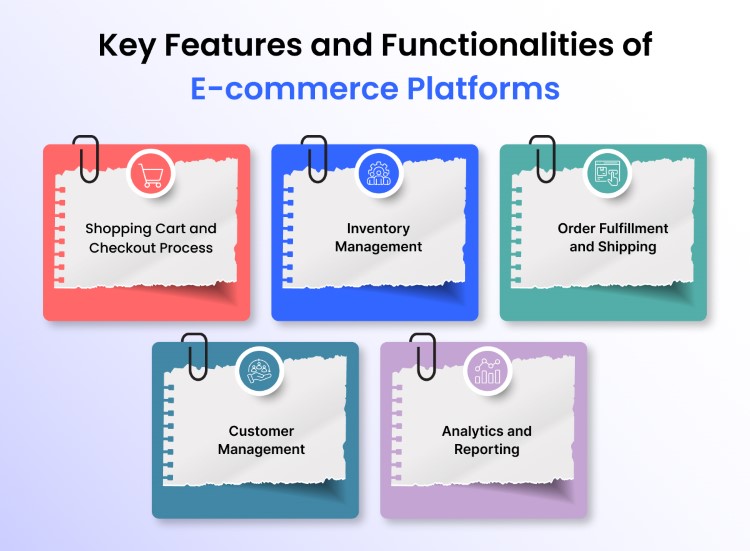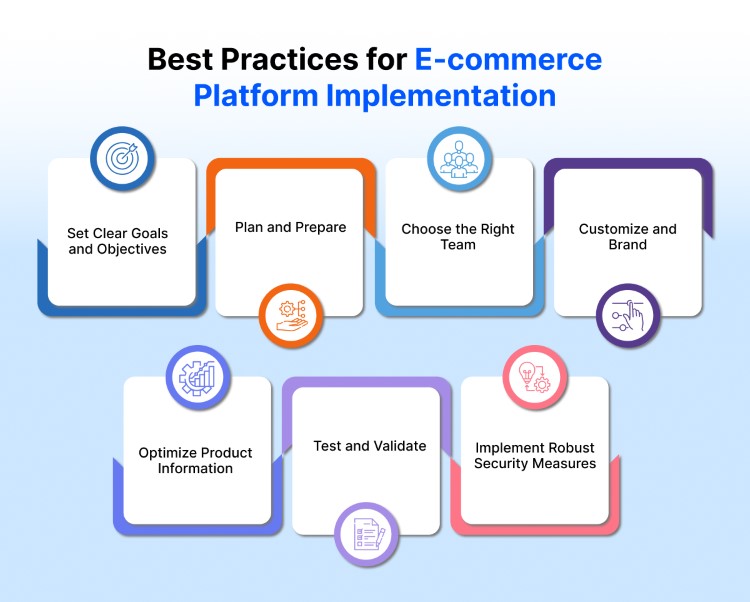Supercharge Your Business with E-commerce Platforms
- June 14, 2023
- 12 mins read
- Listen

Table of Content
Are you an aspiring entrepreneur looking to dive into the thrilling world of online retail? Or maybe you’re a seasoned business owner seeking to expand your market reach and boost your sales to unprecedented heights?
E-commerce platforms have become the holy grail for entrepreneurs and businesses of all sizes. With their power-packed features, seamless user experience, and limitless potential, these platforms have revolutionized the way we buy and sell goods.
These platforms have revolutionized the way we buy and sell goods, providing a virtual marketplace where businesses and consumers can connect and transact seamlessly. In this blog post, we will explore the exciting world of e-commerce platforms and discover how they are shaping the future of retail.
What is an eCommerce Platform?
An e-commerce platform is a software solution or online service that enables businesses to build, operate, and manage their online stores. It provides a comprehensive set of tools and features to facilitate the buying and selling of products or services over the Internet. Essentially, an e-commerce platform serves as a digital marketplace. Where businesses can showcase their offerings, manage inventory, process transactions, and handle various aspects of online retail operations.
These platforms offer a range of functionalities that streamline the entire e-commerce process, from setting up the online store to managing orders, handling payments, and even integrating with shipping and logistics providers. They typically include features like shopping cart systems, payment gateways, inventory management tools, order fulfillment capabilities, and customer relationship management (CRM) functionalities.
It also provides website templates or customizable themes, allowing businesses to create visually appealing and user-friendly online stores without extensive web development knowledge. They often offer options for product categorization, search functionality, and personalized shopping experiences to enhance customer satisfaction and increase conversions.
Furthermore, e-commerce platforms often incorporate analytics and reporting tools that provide insights into sales performance, customer behavior, and marketing effectiveness. This data helps businesses make informed decisions, optimize their strategies, and improve their overall online retail operations.
Key Features and Functionalities of E-commerce Platforms
When it comes to choosing the perfect e-commerce platform, understanding its key features and functionalities is paramount. These crucial elements can make or break your online business. So, before you decide to start or buy online business you should know the core components that define the backbone of any robust e-commerce platform. Let’s explain:

1. Shopping Cart and Checkout Process
A seamless and user-friendly shopping cart system is vital for converting browsing customers into loyal buyers. Look for a platform that offers a hassle-free and intuitive cart experience, allowing shoppers to easily add, remove, and modify items. Additionally, a streamlined checkout process with secure payment gateways is essential to maximize conversions and reduce cart abandonment rates.
2. Inventory Management
Efficient inventory management lies at the heart of a successful online business. An ideal e-commerce platform should provide robust tools to monitor and control your product inventory. This includes real-time inventory tracking, automated stock alerts, and the ability to manage product variations, such as sizes, colors, and styles.
3. Order Fulfillment and Shipping
Smooth order fulfillment and shipping operations are crucial to maintaining customer satisfaction. Look for an e-commerce platform that integrates with reliable shipping carriers and offers features like automated shipping rate calculation, order tracking, and seamless order management. This ensures timely and accurate deliveries while minimizing logistical headaches.
4. Customer Management
Nurturing customer relationships is key to fostering loyalty and repeat business. A powerful e-commerce platform should offer customer management features, such as the ability to create customer profiles, manage orders and returns, track customer interactions, and implement personalized marketing campaigns. An integrated CRM system can elevate your customer service and retention efforts.
5. Analytics and Reporting
To make data-driven decisions, you need access to comprehensive analytics and reporting tools. An excellent e-commerce platform should provide insightful data on key performance indicators (KPIs) like sales trends, conversion rates, customer behavior, and traffic sources. This information enables you to optimize your strategies, identify opportunities for growth, and refine your marketing efforts.
Best E-commerce Platforms
The best e-commerce platform for you depends on your specific needs, budget, technical expertise, and business requirements. It’s advisable to consider factors like ease of use, scalability, customization options, available features, integrations, and pricing when selecting the right platform for your e-commerce business. Let’s take a look at the 5 best ecommerce tools.
1. Shopify
It is a leading cloud-based e-commerce platform known for its ease of use and extensive range of features. It offers a user-friendly interface, a wide selection of professional themes, and a robust app store. Shopify handles hosting, security, and payment processing, making it a popular choice for businesses of all sizes.
- User-friendly interface: Shopify offers an intuitive and easy-to-use interface, making it accessible for beginners without technical expertise.
- Extensive app store: It has a vast collection of apps and integrations that allow you to customize and enhance your online store’s functionality.
- Reliable hosting and security: It takes care of hosting, security, and software updates, ensuring a secure and reliable e-commerce experience.
- Mobile responsiveness: It provides mobile-responsive themes, ensuring your store looks great and functions well on mobile devices.
- Payment options: It supports a wide range of payment gateways, giving your customers flexibility in payment methods.
2. WooCommerce
It is a WordPress plugin that transforms a WordPress website into a fully functional e-commerce store. It provides a flexible and customizable platform, leveraging the vast WordPress ecosystem. It offers various extensions and themes to enhance the store’s functionality and appearance. It is particularly suitable for businesses already using WordPress or those who prefer a self-hosted solution.
- Flexibility and customization: As a WordPress plugin, WooCommerce offers extensive customization options, allowing you to tailor your online store to your specific needs.
- Vast WordPress ecosystem: Leveraging the power of WordPress, you can tap into a vast library of themes, plugins, and resources for further customization and enhancements.
- Scalability: It can handle small to large e-commerce stores, making it suitable for businesses with growth plans.
- SEO-friendly: It comes with built-in SEO features, helping your store rank well in search engine results and drive organic traffic.
- Cost-effective: WooCommerce itself is free to use, though you may need to invest in web hosting and premium themes or plugins for additional functionality.
3. Magento
It is a powerful and feature-rich open-source e-commerce platform. It offers extensive customization options and scalability for large and complex online stores. Magento provides a range of advanced features, including multi-store support, internationalization, and a robust catalog management system. It is generally favored by enterprises or businesses with specific requirements that demand high flexibility and control.
- High scalability and flexibility: It is built to handle large and complex e-commerce stores with high customization requirements.
- Advanced features: It offers a comprehensive set of features, including multi-store support, advanced catalog management, and robust internationalization capabilities.
- Community support: Being an open-source platform, Magento has a large and active community of developers and users who provide support, resources, and extensions.
- SEO-friendly architecture: It is designed with SEO best practices in mind, allowing you to optimize your store for better search engine visibility.
- Enterprise-level capabilities: It is well-suited for enterprise-level businesses that require advanced functionality, extensive integrations, and scalability.
4. Bigcommerce
It is a fully hosted e-commerce platform that caters to businesses of all sizes. It provides a comprehensive set of features, including a user-friendly interface, built-in marketing tools, responsive themes, and mobile optimization. It also integrates with popular third-party services and offers robust SEO capabilities.
- All-in-one solution: Bigcommerce provides a complete package, including hosting, security, and built-in marketing tools, eliminating the need for separate services.
- Responsive themes: It offers mobile-responsive themes that ensure your store looks great and functions well on all devices.
- Abandoned cart recovery: Bigcommerce includes features to recover lost sales by automatically sending reminder emails to customers who abandon their carts.
- Extensive integrations: It integrates with popular third-party services like payment gateways, shipping providers, and marketing tools, enhancing the functionality of your store.
- Strong SEO Capabilities: It provides SEO features such as customizable URLs, optimized page titles, and sitemaps to improve search engine rankings.
5. Wix
It is primarily known as a website builder, but it also offers an e-commerce platform. It provides a simple and intuitive interface, allowing users to create and manage an online store with ease. Wix offers a wide range of templates, built-in marketing tools, and various apps to enhance the functionality of the e-commerce store. It is suitable for small to medium-sized businesses looking for an all-in-one website and e-commerce solution.
- Ease of use: Wix offers a user-friendly drag-and-drop website builder interface, making it easy for beginners to create and manage their online store.
- All-in-one solution: It combines website building and e-commerce functionality in one platform, simplifying the process of setting up and managing your store.
- Beautiful templates: It provides a wide range of visually appealing templates that can be customized to match your brand.
- App market: It has an app market that offers various apps to enhance the functionality and features of your online store.
- Mobile optimization: It automatically optimizes your online store for mobile devices, ensuring a seamless shopping experience for mobile users.
Factors to Consider When Choosing an E-commerce Platform
When selecting an e-commerce platform for your online business, it’s crucial to consider several factors to ensure you make the right choice. Here are some key factors to evaluate:
1. Business Needs and Scalability
Assess your business requirements and future growth plans. Consider factors such as the size of your product catalog, expected traffic volume, international expansion goals, and integration needs. Choose a platform that can accommodate your current needs and scale your business over time.
2. Ease of Use and Customization
Look for an e-commerce platform that offers a user-friendly interface and intuitive tools. Consider your technical expertise and the level of customization you require for your online store. Evaluate the platform’s flexibility in terms of design options, layout modifications, and branding customization.
3. Available Templates and Design Options
Consider the variety and quality of pre-designed templates or themes offered by the platform. Assess whether they align with your brand aesthetics and provide the desired user experience. A range of templates can save you time and effort in designing and launching your online store.
4. Payment and Integration Options
Check the payment gateway options supported by the platform and ensure they align with your business’s preferred payment methods. Consider integration possibilities with third-party services such as accounting tools, shipping carriers, marketing automation platforms, and inventory management systems.
5. Mobile Responsiveness
With the increasing use of mobile devices for online shopping, it’s crucial to choose an e-commerce platform that provides mobile responsiveness. Your online store should display and function seamlessly across various screen sizes and devices, ensuring a positive user experience for mobile shoppers.
6. Security and Compliance
Ensure the platform prioritizes security measures, such as SSL encryption, secure payment processing, and data protection. Additionally, check if the platform complies with industry regulations, like PCI DSS (Payment Card Industry Data Security Standard) for handling credit card information.
7. Support and Documentation
Evaluate the platform’s customer support options, including email, live chat, or phone support. Also, check if they provide extensive documentation, knowledge bases, or tutorials to assist you in setting up and managing your online store effectively.
8. Pricing and Total Cost of Ownership
Consider the pricing structure of the e-commerce platform, including monthly fees, transaction fees, and any additional costs for advanced features or integrations. Compare the pricing with the value and capabilities the platform offers to ensure it aligns with your budget and provides a good return on investment.
Best Practices for E-commerce Platform Implementation
Implementing an e-commerce platform requires careful planning and execution to ensure a smooth and successful launch of your online store. Here are some best practices to consider during the implementation process:
1. Set Clear Goals and Objectives
Define your business goals and objectives for the e-commerce platform implementation. Outline what you want to achieve, such as increasing sales, expanding your customer base, or improving customer experience. Clear goals will guide your decision-making and help measure the success of your implementation.
2. Plan and Prepare
Develop a comprehensive project plan that outlines the tasks, timelines, and resources required for implementation. Create a checklist of all the necessary components, such as product data, imagery, pricing, and shipping details. Adequate preparation will help streamline the implementation process and reduce potential delays.
3. Choose the Right Team
Assign a dedicated team or individual responsible for managing the e-commerce platform implementation. Ensure they have the necessary expertise and resources to handle the project effectively. Collaborate with cross-functional teams, including marketing, IT, and customer service, to ensure a smooth integration of the platform.
4. Customize and Brand
Tailor the design and branding of your e-commerce platform to align with your business identity. Customize the templates, colors, fonts, and imagery to create a consistent and engaging user experience that reflects your brand personality. Make sure the platform’s layout and navigation are intuitive and user-friendly.
5. Optimize Product Information
Ensure that your product information is accurate, comprehensive, and well-optimized. Include high-quality product images, detailed descriptions, specifications, and pricing information. Use relevant keywords and SEO best practices to improve search engine visibility and enhance the discoverability of your products.
6. Test and Validate
Thoroughly test all aspects of your e-commerce platform before the official launch. Check for functionality, responsiveness, and compatibility across different devices and browsers. Test the shopping cart, checkout process, payment gateways, and any integrations you have implemented. Validate that all features and functionalities are working as expected.
7. Implement Robust Security Measures
Implement strong security measures to protect your customers’ data and ensure secure transactions. Utilize SSL encryption, implement secure payment gateways, and follow best practices for handling customer information. Regularly update and patch your platform to guard against potential security vulnerabilities.
Conclusion
E-commerce platforms have transformed the way businesses operate and consumers shop. With their user-friendly interfaces, robust features, and extensive reach, these platforms have opened up a world of opportunities for entrepreneurs and consumers alike.
Whether you’re a small business owner, a large enterprise, or an individual looking to sell your products online, e-commerce platforms provide the tools and infrastructure needed to succeed in the digital marketplace. As technology continues to advance and consumer behavior evolves, e-commerce platforms will undoubtedly play an even more significant role in shaping the future of retail.
So, embrace the power of e-commerce platforms and take your business to new heights in the digital realm!









